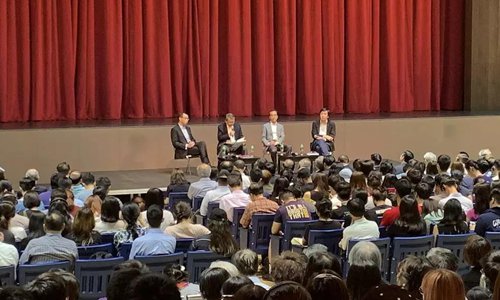HOME >> CHINA
A mainland student stands against radical HK youth that insulted her in CUHK
By Bai Yunyi and Zhao Juecheng in Hong Kong Source:Global Times Published: 2019/10/12 19:15:20

Photo: Chen Qingqing/GT
In the wake of the months-long turmoil in Hong Kong, the Chinese University of Hong Kong (CUHK) organized a public dialogue on Thursday that was attended by students and alumni, with an attempt at opening a communication gateway between the university leaders and protesting students. During this forum, a mainland student’s speech criticizing the extremity of Hong Kong’s anti-government students garnered wide-scale support online, especially among mainland netizens.
Zhang Ting, a Chinese mainland student of the CUHK, made her statement in Putonghua during the conference but she received backlash and abuses, from local students who opposed her stance. “If I don’t have a strong heart, I would be very scared when I am facing your insults and abuses. You are always blaming others, but you never think that it was you who are actually breaching the rule of law, destroying freedom and democracy of Hong Kong.”
Zhang told the Global Times that “I maintained a calm and peaceful demeanor, even when I was being abused with foul language,I ended my statement with a smile .”
Because I was sad for those radical people who insulted me. “It was me who validated the principle that ‘the rule of law is the basis of democracy and freedom’ and ‘nothing can be accomplished without norms or standards’, even though, they continue to flout the rights of the non-local students to exercise our freedom of opinions.”
When recalling Thursday’s infamous happening, Zhang continued to be very calm and peaceful. She told the Global Times that she was not scared at all and when the insults and abuses got louder, she tried harder to finish her key points. “The only thing I care about is that their loud noises hijacked my voice.” Zhang worried the different stance of people like hers has not been heard by extreme local students.
After Thursday night, Zhang said, she wants to tell more local students that “we respect your freedom of speech, but please, you also need to respect the freedom speech of those people who hold different political views.”
She cited an example from Thursday’s dialogue where a female local student claimed of an alleged sexual assault by the police. Zhang explicated that even though the victim could solve her problem by complaining to the police or seeking legal assistance from lawyers, instead she decided to use a public forum of the university to speak about her alleged sexual harassment, and this Zhang feels actually is hijacking the university’s leaders.
“The university’s president is neither a judge nor the chief executive of Hong Kong, he cannot verify the case. If the president learns the case only from the female student’s narrative, and agrees with the girl, then this is not the rule of law that should be respected in Hong Kong, it is the rule of a specific person,” Zhang said.

Photo: Chen Qingqing/GT
The youngsters of Hong Kong haven’t realized that what they are doing right now actually contradicts what they claim to safeguard, Zhang noted.
The chaos in Hong Kong has penetrated all universities, and the CUHK is at the forefront, which has even got the tag of “violence university” because a large number of students from the university participated in the rampage on the streets.
A female student from the mainland was harassed by a group of Hong Kong students, and her room was sabotaged after she hoisted the Chinese national flag on the window of her dormitory on the National Day.
Zhang told the Global Times that in addition to students from the mainland, the daily lives and studies of students from other regions have also been plagued. For example, classes have been suspended due to the closure of subways, and on-campus cafeterias were out of service.
“We can put up with these situations, but what’s worse is the psychological effect inflicted on everyone,” said Zhang. She likened the situation in the university campus as a “dark horror”, with posters hanging everywhere.
Non-indigenous students are worried about being exposed and attacked for expressing their opinions on the situation, even if they are eager to.
Zhang told the Global Times that the female student who hoisted the national flag has left the campus following severe threat to her personal safety.
Zhang still hopes mainland students in Hong Kong could avoid overreaction because of rage and fear. “I don’t want to see the gap expanding between Hong Kong and mainland students, and the remarks I made the other day were not meant to provoke conflicts,” Zhang told the Global Times.
She appealed to all the mainland students in Hong Kong that “We shouldn’t abandon communication and exchange during such a tough time, instead we should manage to let Hong Kong students know more about mainland students and their motherland through communications.”
In the meantime, she also hopes CUHK de-politicizes university affairs. “Just as the [CUHK] president said universities are academics, and not for political tussles.”
She also suggested that the university should remove the political slogans posted everywhere on the campus and that teachers should adhere neutrality, and more importantly, “instead of indifferent indulgence, the university should tell those who violate regulations or laws that what they did is wrong,” said Zhang.
Her Hong Kong peers are the ones to whom Zhang wants to offer a piece of sincere advice. “Many young Hong Kong indigenes said that we don’t know much about Hong Kong, but the truth is that we not only know about Hong Kong, we also have our own judgment toward the region.”
“In return, I hope they could have a better understanding of their motherland by paying more visits to the mainland, viewing the mainland from the aspect of development, and experiencing a different mainland compared with the past,” Zhang suggested.
She also suggested the youngsters of Hong Kong contribute to the areas where the mainland might be lagging behind. “Together we can make our country better,” Zhang said.
“I hope youngsters in Hong Kong could give it a thought that what do they want eventually, was it ‘perishing together?’” Zhang asked.
She suggested pondering on more international issues instead of just being confined to Hong Kong, such as the trade war between the US and China. “Perhaps they can find a new solution.”
Posted in: SOCIETY